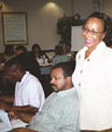Conflict Resolution
Karen Mack Management Consultants LLC
 The atmosphere at work is strained due to interpersonal conflict amongst co-workers.
Face it, where human beings are placed together consistently for extended periods of time, conflict is likely to occur. While positive attributes of conflict exist, chances are negative emotions and dubious behaviors begin to emerge. Among the core roots of conflict is a difference in style, culture, gender, methodology, beliefs, values, etc. The atmosphere at work is strained due to interpersonal conflict amongst co-workers.
Face it, where human beings are placed together consistently for extended periods of time, conflict is likely to occur. While positive attributes of conflict exist, chances are negative emotions and dubious behaviors begin to emerge. Among the core roots of conflict is a difference in style, culture, gender, methodology, beliefs, values, etc.
Understanding and respecting diversity is vital to managing conflict constructively. Communicating Through Conflict, Emotional Control, and Power Communication for Women address these differences, and provide proven communication techniques to handle discord more effectively.
 Tip: Try to take an objective look at the situation you find yourself in. The more objective you are, the more information you'll have to make qualified decisions. Tip: Try to take an objective look at the situation you find yourself in. The more objective you are, the more information you'll have to make qualified decisions.
Communication Seminars
Communicate Through Conflict
Focus Communication to Resolve Conflict
 Unresolved "issues" lower morale and productivity while increasing conflict and stress. People are typically drawn into the negative effects of conflict; they rarely consider or take advantage of its benefits. Conflict can expose innovation and reveal hidden resources. Communicate Through Conflict relies heavily on communication techniques to comprehend behavior, understand and accept differences, and convey messages with clarity. The outcome of this training is to identify paths to amenable resolutions. Unresolved "issues" lower morale and productivity while increasing conflict and stress. People are typically drawn into the negative effects of conflict; they rarely consider or take advantage of its benefits. Conflict can expose innovation and reveal hidden resources. Communicate Through Conflict relies heavily on communication techniques to comprehend behavior, understand and accept differences, and convey messages with clarity. The outcome of this training is to identify paths to amenable resolutions.
What to Expect: The complexities of communication, such as, sending mixed messages, selective listening, encountering biases, etc., are dissected to increase awareness and understanding. Style differences are identified; techniques to use and gain cooperation are practiced. Ideas are shared to manage negative emotions and diffuse aggressive or defensive behavior(s). Coping with difficult people and maintaining composure are discussed as ways to build functional relationships. Exercises and case studies foster discussion to create and encourage alternative outcomes.
Note: I recommend the Thomas-Kilman Conflict Mode InstrumentTM or a comparable assessment to help participants see themselves and gain information to improve communication with others. Assessments will be ordered upon request.
Professional Development Seminars
Emotional Control (EC)
Capitalize on Emotional Intelligence
 E.Q. (Emotional Quotient or Emotional Intelligence) has proven to be a more substantive barometer than I.Q. (Intelligence Quotient) when determining one's personal and professional success. Emotional Intelligence is the ability to understand one's feelings to manage and use emotions to improve personal/professional relationships. People with high E.Q.'s can empathize with others and make use of emotional information to make connections and enrich relationships.
E.Q. (Emotional Quotient or Emotional Intelligence) has proven to be a more substantive barometer than I.Q. (Intelligence Quotient) when determining one's personal and professional success. Emotional Intelligence is the ability to understand one's feelings to manage and use emotions to improve personal/professional relationships. People with high E.Q.'s can empathize with others and make use of emotional information to make connections and enrich relationships.
What to Expect: The class identifies perceptions, attitudes, and behaviors - while providing steps toward acceptance and change. Assertive techniques are taught to build confidence to better handle emotionally charged events. Managing anger, stress, and negativity is discussed in detail. Communicating effectively when dealing with criticism and conflict are among the most rewarding segments of training. Participants have many opportunities to review past behaviors that have produced negative or unproductive results. Troublesome situations and circumstances, as it relates to the work environment, are identified.
Note: EQ assessments/Anger Management tests can be ordered to evaluate how participants manage their emotions or anger.
Communication Seminars
Power Communication for Women (PCW)
Gender Specific Communication Skills
 This interactive seminar speaks specifically to the communication challenges women face. The content revolves around techniques to be heard, taken seriously, and to speak with confidence. Participants become savvy in office politics while learning how to gain respect from managers and peers. They will identify and learn tips to resolve and manage communication anxieties and fears.
This interactive seminar speaks specifically to the communication challenges women face. The content revolves around techniques to be heard, taken seriously, and to speak with confidence. Participants become savvy in office politics while learning how to gain respect from managers and peers. They will identify and learn tips to resolve and manage communication anxieties and fears.
What to Expect: PCW provides methods to identify common mistakes that often result in misperceptions. The basics of public speaking are reviewed; tips on effective recovery from communication blunders are provided. Students improve voice quality and develop clarity in speech. The relationship between healthy self-esteem and communication are discussed; assertive techniques vs. aggressive behaviors are revealed. Participants also revisit nonverbal communication including personal appearance and presence. This result-driven seminar promotes confidence and professionalism.
|